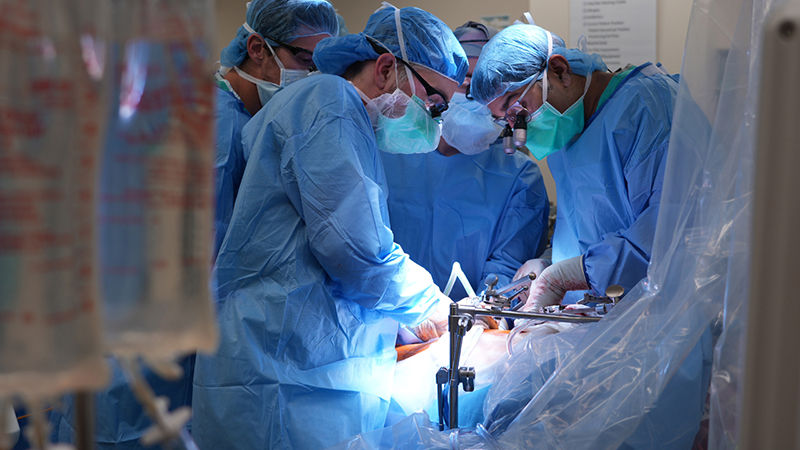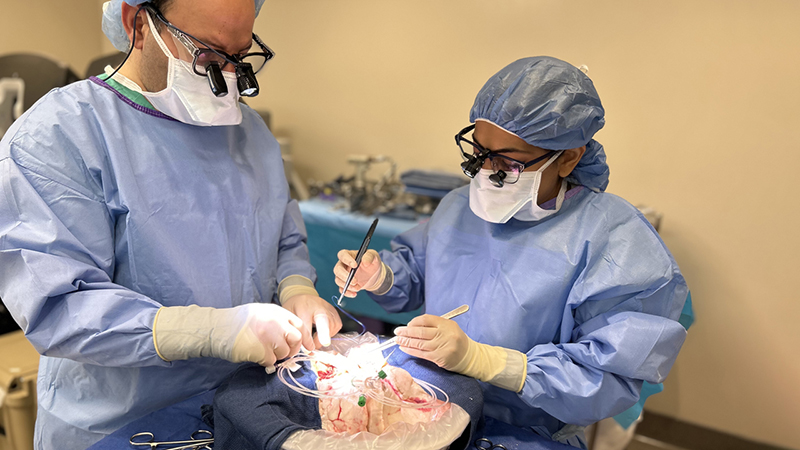Leading-Edge Weapon Fights Liver Cancer
Pump Delivers High Doses of Chemo Directly to Liver
When most people think of chemotherapy, they think of systemic treatment, in which medication is delivered via IV or pill, and circulates through a patient’s body to help kill cancer cells. Now there are ways to apply chemotherapy directly to the cancer site in much higher doses. This cancer-fighting approach is called regional therapy.
One of the most exciting regional therapies now available is placement of a hepatic artery infusion pump. This therapy, offered at only a handful of facilities in the U.S., involves the surgical placement of a pump to deliver chemotherapy directly to the liver. Because the medication is delivered directly to the liver tissue, it can be 100 to 300 times stronger than the dose that could be safely administered systemically.
Surgical Oncologist Ryan P. Merkow, MD, MS, who performs hepatic artery infusion pump surgery at Northwestern Memorial Hospital, explains that because the chemotherapy is delivered directly to the liver, it is completely broken down, or metabolized, by the organ, sparing the rest of the body from the toxic effects of the high-dose chemotherapy.
Dr. Merkow established the program at Northwestern Memorial Hospital in partnership with Medical Oncologist Devalingam Mahalingam, MD, PhD. The ultimate goal of the therapy is to destroy enough of the cancer cells with medication to allow the surgeon to remove any remaining cancerous tissue, ridding the patient of cancer. However, if complete removal of cancerous tissue is not an option, the pump can at least slow the growth of the cancer and prolong survival. This therapy can also be used after removal of all disease in the liver to reduce the chance the cancer will recur.
We’ve been able to surgically clear their entire liver of all disease in many cases.— Ryan P. Merkow, MD, MS
Candidates for Hepatic Artery Infusion Therapy
At Northwestern Memorial Hospital, hepatic artery infusion chemotherapy is used to treat individuals who have colorectal cancer that has spread, or metastasized, to only the liver. This is the most common form of metastatic colorectal cancer. It can also be used for other less common liver cancers, such as intrahepatic cholangiocarcinoma (bile duct cancer). Candidates for the procedure are carefully selected by a multidisciplinary team of oncology experts.
“We’ve seen some really remarkable responses in patients who are on second-line, and even third-line chemotherapy who get a hepatic artery infusion pump placed, although we also know that the earlier in the disease course we use this treatment, the better the response will be,” says Dr. Merkow. “We’ve been able to surgically clear their entire liver of all disease in many cases.”
Patients who have a pump placed still receive systemic chemotherapy, but are typically given a lower dose than they would have otherwise received, which reduces toxicities and side effects, and has been shown to improve quality of life, Dr. Merkow says.
Pump Placement
The pump, which is about the size of a hockey puck, sits in the abdominal wall. It can be seen and felt through the skin, so it does take patients some time to get used to it, says Dr. Merkow. Patients typically need to come into the office every two weeks, either for chemotherapy or for filling the pump with saline to keep it functional, and to monitor for possible side effects.
The pump normally stays in place for two or more years, even if the patient gets more immediate results. That way, if the cancer does recur, the pump can be used to quickly restart chemotherapy. When the time comes for removal, it can be accomplished in a fairly simple outpatient procedure.
“It’s pretty exciting,” says Dr. Merkow. “We have the unique ability now at Northwestern to offer this in the setting of other really leading-edge tools and techniques with some of the other specialists here, like our interventional oncologists. We can truly provide patients with tailored, world-class, comprehensive, multidisciplinary cancer care.”





